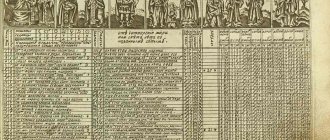Just a century ago, it was very easy to name a newborn child. On his birthday, mom and dad simply looked at the calendar and chose one of several options (sometimes there was only one). Today, not everyone follows church traditions, and many of the names of saints are outdated. And most often, parents give the baby a name based on fashion, wanting to stand out, or simply because they liked what their friends named the baby. Nevertheless, many people in our country baptize children; some take this Sacrament seriously, while others perceive it as a formality. What name is the baby given? And what to do if the worldly name is not in the calendar.
How to determine a child's baptismal name
Parents who take into account church traditions when choosing a name for a child proceed as follows:
- They look into the Monthly Book (printed in every Orthodox calendar), and choose the option they like from the list of male and female names.
- They can choose the name of a saint whose memory is celebrated in the coming days (before and after the baby’s birthday).
- They choose a name in honor of a saint who is especially revered in the family (for example, Nicholas the Pleasant).
Perhaps there is a particularly revered saint in the family, and the child was named in his honor
. The baby is named according to the vow. For example, a woman could not get pregnant for a long time and prayed to the Venerable Ksenia of St. Petersburg, promising that if the Lord gave her a daughter, she would name her Ksenia.
Perhaps the mother, after a long period of infertility, made a vow, for example, to Ksenia of Petersburg, that she would name her daughter in her honor
In addition, it happens that parents really like a certain name, and it is in the calendar. But childbirth, for example, falls in the spring, and the memory of a saint with this name is celebrated in the fall. In such cases, the Church has nothing against people implementing their plans.
For example, Vladislav has a name day only one day a year - October 7th. Of course, parents whose son was born far from this date are not prohibited from naming their son this way. Veronica's name day is October 17, Victoria's name day is only October 24, Valeria's is May 6 and June 20, Kira's is December 17 and March 13.
Some saints have name days only once a year, but you can still name your child that name
But there are male and female names that are quite popular today, whose name days are celebrated many times a year. Here are just a few examples:
- Maxim: days of remembrance of saints with the same name - September 12, September 18, September 28, October 8, October 22, November 4, November 5, November 9, November 10, November 12.
Name days of some saints with a certain name are celebrated many times a year
Leo - September 20, September 24, October 24, November 25, December 20, January 12, February 2, March 3, March 5, May 31. Vasilisa - September 16, January 21, February 18, March 23, April 4, April 28, April 29, July 4. Angelina - September 12, December 23, July 14, August 12.
Folk signs
Previously, the child was given a secret name in order to protect him from the “bad” eye. Our ancestors believed that they could not spoil the baby if they did not know the middle name. For this reason, the closest people were invited to the sacrament of baptism, who would not tell anyone what name the baby was baptized with. Until now, parents who believe in popular beliefs give the child a secret name and do not tell it to anyone, so that no one can harm the baby.
They say that in all rituals associated with the application of damage and the evil eye, the church name must be called. If you don’t know it, you won’t be able to perform the ritual.
There is a child’s name in the calendar, but with a different sound: how to baptize Artyom, Svetlana, Denis and others
If we do not find the name of a child in the calendar, this does not always mean that he is not there. Often there are simply archaic forms that are unusual for us today. There are many examples:
- Julia - Julia.
- Ulyana - Juliana.
- Ivan, Jan - John.
- Yana, Zhanna - Joanna.
- Angela - Angelina.
- Stepan - Stefan.
- Denis - Dionysius.
- Artyom - Artemy.
- Yuri - Georgy.
- Angela - Angelina.
- Sergey - Sergey.
- Lily - Leah.
- Aksinya - Ksenia.
- Ilona, Nelly - Elena.
- Egor, Yuri - Georgy.
Some worldly names are not in the calendar, but there are names with a similar sound (archaic), an example of this is Julia and Julia
Some Slavic names have the same meaning as church names (usually Greek). An example of this is Svetlana. A girl with this name can be christened Photinia (from the Greek “light”).
Some names have their own church analogues, but not based on sound, but in meaning (for example, Svetlana - Fotinia)
A similar pair of names is Bogdan and Theodotus (Greek: “given by God”).
Some modern parents have a tendency to initially name their baby with a name with an ancient sound: not Danil, but Daniil, not Natalya, but Natalia. If they want this, the priest will not mind, and the calendar will only help them make a choice.
However, some priests believe that naming a baby this name should be the sincere desire of Orthodox parents, and not just a way to amaze others and emphasize their originality.
The mystery of the name Alice
A strong-willed, weak woman who is able to use her talents without flaunting them. Sometimes it seems that Alice is completely shrouded in mystery and magical power. She is mysterious and at the same time open, she has zest and hidden talents.
Naming the girl with the name Alice gives the girl a rich imagination. But she does not prevent the girl from looking at the world without rose-colored glasses, soberly assessing the current situation. At any age, a girl does not live in a world of dreams and made-up rules; fantasy helps her to realize herself, act creatively and express herself on the career ladder.
If there is no name in the calendar: Alisa, Miroslava, Karina and other names
Many parents today strive to name their baby in a fashionable, original, and resonant name. And it often turns out that there is no such name in the calendar (and there is no similar-sounding archaic form). In this case, the priest suggests choosing a name that simply sounds similar or has a similar meaning. Traditionally established correspondences can be found in official Orthodox online publications (for example, azbuka.ru, pravoslavie.ru, https://beleparh.ru/). You can also go to a temple or church shop and ask for help there. Here are some traditional correspondences for worldly names that are not in the Monthly Word:
- Alice - she is baptized under the name Alexandra, Vasilisa . Moreover, most often a girl with this name still receives the name Alexandra - in honor of the holy passion-bearer Alexandra Feodorovna Romanova, who before converting to Orthodoxy bore the name Alice.
A girl named Alice can be christened, for example, as Alexandra or Vasilisa
Angelina - she is baptized under the name Angelina. Alina - she is baptized under the name Alexandra or Inna. Arina - she is baptized under the name Ekaterina, Marina. Diana - Digna, Anna. Vitalina - Victoria. Eve. The situation with this name is very interesting. Although it is directly related to Christianity (Eve was the name of the first woman on earth), until recently a girl with that name would have been christened Evgenia or Evdokia (Eve was not included in the Orthodox calendar). But about 18 years ago, the Russian Orthodox Church decided to canonize the abbess of the Penza monastery, Abbess Eva (she was shot by the NKVD in 1937). And today, little Eva’s parents can christen their daughter with her own worldly name.
Although the name Eve is directly related to Christianity, a saint with that name appeared only about 20 years ago
Yesenia - Ksenia, Yesia. Dana - Daria, you can also choose a name based on the common meaning - Theodosius (“God given”). Yana - Ioanna. Karina - Cleopatra, Kira. Milana - Melania, Militsa, Anna. Miroslava - Marina, Maria, Irina. A very beautiful gentle name has an interesting history. It is not in the Orthodox calendar, but the patroness of girls and women with this name is the Virgin Miroslava of Constantinople. According to historical data, her husband was persecuted for his Christian faith, he was tortured, and then sent into exile with his wife and children. There he died, and traces of his relatives were lost. Meanwhile, in the Orthodox Slavic countries closest to us, girls are baptized precisely under the name of Miroslava (in Bulgaria, Ukraine, the Czech Republic, Slovakia), and the days of memory of this saint are celebrated here (May 5 - in Bulgaria and Ukraine, April 5 - in the Czech Republic and Slovakia, 29 March - additionally in Slovakia).
The Russian calendar does not contain the name Miroslav, but in other Slavic countries girls are baptized with this name
Olesya - Alexandra, Vasilisa. Polina - Apollinaria, Pelageya. Timur - Timofey. Ruslan - Roman, Rostislav. However, such a child can also be christened Leonid, based on the meaning of the names: both of them mean “like a lion” (“like a lion”). Ratmir - Roman. Stanislav - Svyatoslav.
The son was baptized with a different name. How to perform a funeral service?
Estimated reading time: 2 minutes.
Reader question:
Hello! One question has been bothering me for a long time. When my son was born, and two months later we came to the Temple to baptize him, I was determined to ask for a different name in Baptism (so that they wouldn’t be able to “say” anything on him). Because I myself faced this problem. Then the priest was against it and said: “You will not be happy.” He went to baptize the baby and gave him the name she asked for. He is Miron, baptized Mikhail. Only later at home did it dawn on me that his time would come someday, and during the funeral service I would no longer tell his children this. If they forget that he is Michael, will the funeral service be invalid? Is it possible to go to the temple to have a prayer read over him about naming a name on the eighth day with his name? And then he will receive communion with a new name, it will be with him further in church life. Or maybe I misunderstood something. The essence of my question is how to help my son’s soul after his life, so that they pray for him correctly and will a prayer with the name Myron count for him?
Archpriest Andrei Efanov answers:
Archpriest Andrey EFANOV
Hello! Manipulation with double names is an old pagan custom that is completely irrelevant for a Christian! It was earlier that people, not knowing exactly what the cause-and-effect relationships were, came up with various theories of magic, in particular, contagious magic - that an object belonging to the owner has a connection with him and through it something can be done with the owner. The name can also be included in such objects, and hence theories arise that knowledge of the true name supposedly (!) gives power over its bearer. Therefore, the pagans had two names - which everyone knew and which only the chosen ones knew.
As you understand, these are all artificial constructs, like many signs and superstitions, and all this has long been dismantled by ethnographers and anthropologists.
Baptism is a Sacrament during which a person becomes a member of the Church of Christ. He must somehow figure in It, and therefore in Baptism the name with which a person participates in the Church Sacraments is given. There is no meaning in a double name: knowing the name does not give any power over its bearer, so you shouldn’t have complicated everything... but oh well. Not a single Sacrament has retroactive effect and is not repeated. The naming prayer is read before Baptism. After Baptism, a person lives in the Church with the name with which he was baptized. That is, your son in the Church is Michael.
And now a question about the funeral service. You baptized your son, but children are baptized in order to give them communion. And so I think, is it really possible that your son, if he grows up in the Church, if he is a normal Christian, that is, as an adult he will confess, take communion and lead a spiritual life, he will not tell either his wife, or children, or anyone else church name? Yes, the entire parish, the priest, his wife and children, who will pray for his health, will certainly know that it is he who is Miron in his passport, and Mikhail in Baptism. And rest assured, with this order of things, no confusion can simply happen.
God bless you!










